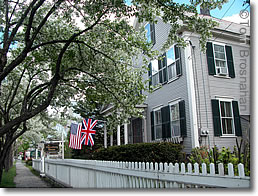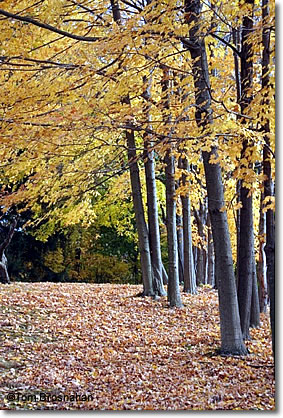New England Hotel Map with Prices
Booking.com: Our Partner
When we travel to research our travel websites, we usually make our hotel reservations via Booking.com for good reasons: excellent prices, pay-when-you-stay, free cancellation, millions of reliable reviews, and an easy-to-use website that makes it quick and simple to compare locations, rates and facilities, and to book our room. More...
Booking.com helps to support NewEnglandTravelPlanner.com, so when you use their site, it costs you no more, but helps us to provide all the pages of travel information we offer you for free.
Advance Reservations
Note that advance reservations are essential in some areas and at some times of year; and payment requirements may vary.
The busiest periods are high summer (mid-July through Labor Day), foliage season (mid-September through Columbus Day), Christmas and New Year's Eve, and ski season (late January through March).
Low seasons, when business is slack and many inns may be closed, are April, May, and November through late December.
Know the Rules!
Inn and resort brochures paint rosy pictures of the warm welcome you're bound to receive, and of the friendliness and hospitality of your hosts.
But innkeepers are in the lodging business, and they must make a profit, so they make certain stipulations that you must know about.
If you make a reservation and put down a deposit, and the inn or hotel accepts your deposit and confirms your reservation, you have made a legal contract. However, it is usually the inn that spells out the terms of the contract, and this can lead to unpleasant—and sometimes costly—surprises.
When making reservations, you can avoid hassles and disappointments by asking some of the following questions:
—Is smoking allowed in the inn?
—Are children welcome? What age?
—What about pets?
—Is there a required minimum stay of two, three, four nights, or even more?
—Can you reserve a precise room or sort of room ("with antiques," "in the main inn and not in the annex," "with a canopy bed and full bath," "with a view of the water") or must you take whatever the innkeeper gives you?
—How many beds does the room have? Real beds or sofa beds?
—Can you get all this in writing?
—Are meals included or required? If breakfast is included, is it store-bought doughnuts and instant coffee, or freshly made pastries and brewed cafe au lait?
—If the inn has no dining room, how close is the nearest restaurant?
—Is there a service charge? Is there tax? How much?
—Are there any other charges, such as for activities or use of a fireplace? They might not tell you if you don't ask.
—Are credit cards accepted? Never assume that they are! Many of the most popular inns refuse to accept credit cards, preferring not to pay the 2% to 6% service charge to the credit-card company. They require cash, traveler's checks, or an approved personal check, sometimes for the full amount of your reservation, which might approach $1,000; and sometimes the full amount must be paid upon arrival. Be prepared. (For the record, the majority of lodgings in New England do accept credit cards.)
—How much deposit must you send, and how soon?
—Under what circumstances can you ask for, and receive, a refund of your deposit? What if you are delayed in transit by car problems, a late train or ferry, or weather conditions impossible for flying?
—Does the deposit guarantee you a room at the inn absolutely, or does the innkeeper have the option of finding you "equivalent lodgings nearby" if the inn is overbooked?
—If your deposit is to be returned, will a "service charge" of 10% to 25% be deducted?
—What is the deadline for the innkeeper's return of the deposit? Two weeks? Two years?
Paying attention to details such as these is tedious, but it's necessary if you want to have a hassle-free vacation.
Saving Money
Although it's a good idea to have advance reservations for some destinations and times of year, you may be able to save money on hotels that are not fully booked.
Some of these last-minute deals are available on Booking.com, so be sure to check there.
Are Pets Welcome?
Although most lodgings still do not accept pets, more and more are making arrangements for your animal companion.
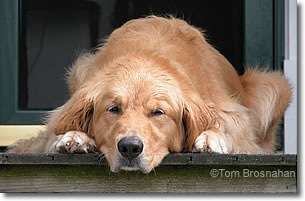
Traditionally, most lodging places in the New England states did not accept pets in their guest rooms.
But this is changing.
Because of the number of travelers who now wish to travel with their pets—especially dogs—ever more hotels, motels and inns are making arrangements for pets as guests, either in or near their owners' rooms.
Quite a number of hotels and motels in and around Boston now accept pets, for example.
Be sure to ask if pets are accepted at your selected lodgings, and the requirements, which may include:
—Limits to the weight or size of the pets, and the number of pets
—Guests must stay with the pets at all times, or have them crated or delivered to a kennel if left alone
—Extra charges for pets ($20 to $25, for example)
—Release forms indemnifying the hotel for injury to the pets and damage done to hotel property by the pets
—Pets must be leashed or otherwise under control, whenever outside the guest room
That having been said, some hotels that accept pets may provide extra services for your pet, including bedding, food and water, treats, grooming, dog-walking service (for an additional charge), and maps of nearby pet-friendly parks and walking areas.
Those with allergies to animals may also want to look at hotels' pet policies for their own comfort.
Foliage Season Lodgings
You want to enjoy the fall foliage in New England, but you haven't made hotel reservations. Can you still find a room? Perhaps.
Do You Need Reservations?
It depends where and when you travel, and what sort of accommodations you prefer.
New England's fall foliage season, when its forests display blazes of leaf color, depends on summer and autumn rainfall, temperatures, and other climatic factors, so it's impossible to predict in advance when the fall foliage color may "peak" (be at its most brilliant) in any particular area.
During "peak season," particularly on weekends, and especially on the 3-day Columbus Day holiday weekend, New England hotels, motels, inns and B&Bs will be most heavily booked.
How to Vagabond
With proper planning and a bit of luck, it is possible to "vagabond" in New England during foliage season and not have to make all of your hotel reservations far in advance. Here's how:
Fall foliage color begins in the higher elevations and cooler clime of northern New England, usually about mid-September, and spreads southward, reaching the coastline and islands of Massachusetts, Rhode Island and Connecticut in late October. Pockets of color may last well into November in protected valleys.
1. Plan to be in resort areas (mountains, lakes, seacoast) during the week (Sunday through Thursday nights), and towns and cities on weekends (Friday and Saturday nights). Prices will be lower and crowds smaller this way.
2. Avoid touring on Columbus Day weekend, as that is the busiest time of all for foliage-watchers. Some accommodations, especially inns, may require a 2-night minimum stay. If you avoid touring in the countryside on any weekend in late September through mid-October, you'll have a much easier time finding exactly the accommodation and price you want.
3. Consider all types of accommodations. Many foliage-seekers prefer the charming accommodations of a New England country inn or bed-and-breakfast guest house, but if you leave yourself open to staying at roadside motels or city hotels, you'll find more rooms available at a wider range of prices. Hint: ski resorts always have lots of lodging, and they may not be fully booked before ski season begins.
4. Research possible lodgings at least a day in advance. Northern New England is not as densely populated as the south, so you need to learn if there are even beds where you might want to sleep!
5. Call ahead from the road to check for vacancies and room rates.
6. Don't wait until the end of the day to find your bed. Have some idea where you'll stay by mid-afternoon at the latest (earlier if possible), and call ahead to learn about the lodging situation. This is particularly important on Fridays as lodgings may fill up for the weekend.
"Sense of the Market"
After a few days' travel, you'll get a "sense of the market," and whether or not you'll have to make more reservations in advance.
Check room rates and availability here...
New England Country Inns
Country inns are New England's glory: country estates, town mansions, restored farmhouses and traditional village taverns, all providing clean, comfortable accommodations and a list of other services.
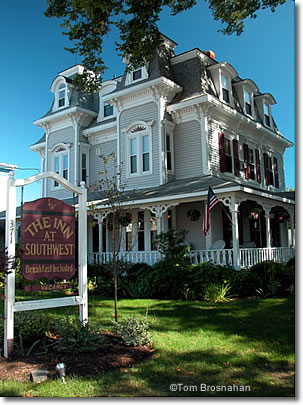
The Inn at Southwest Harbor, Bar Harbor ME.
New England country inns are no longer the simple, informal roadside guesthouses that they were in olden days.
Rather, they are more like small vacation resorts, without the big-production feel.
Smart Planning!
What you want to do is plan your city visits for weekends (or at least partly so), and spend Sunday or Monday through Wednesday or Thursday nights out in the country.
Reservations
You may have to reserve well ahead for a country-inn room, particularly if you wish to stay when there's some big event nearby, or during New England's foliage season.
Room Rates
Unlike in New England motels, where rooms are often standardized, inn room rates vary considerably from room to room depending on the particular room, its size and amenities, number of occupants, day of the week, season of the year, and concurrence with special events such as holidays or local festivals.
Calculating your cost can be complicated at some inns. For example, an inn may charge $195 per night for a double room with bath in summer on Monday through Wednesday nights, but $260 for the same room on Thursday through Sunday. To these rates you may have to add $10 for the maid's tip (sometimes required), $15 if you use the fireplace in the room, and 9.7% room tax. All in all, that comes to $241 for the "$195" Monday-through-Wednesday room, or $313 for the "$260" Thursday-through-Sunday room.
Minimum Stay
The innkeeper may require a minimum stay of two, three, four, or even more days, particularly if there is an event at the time you visit. For example, lodgings in Massachusetts's Berkshire Hills are much more expensive on summer weekends, when all the arts organizations (especially the Boston Symphony Orchestra's concerts at Tanglewood) stage performances.
Payment & Cancellation Terms
Payment for your stay may be required in a certain form—even in cash—and perhaps in advance. Ask for, read, and carefully consider the payment and cancellation terms!
Package Deals
Speaking of days-of-the-week, city hotels offer discounted weekend packages, since the business trade is light on weekends. But for country inns, Friday and Saturday nights are the busiest, and other nights tend to be cheaper—and quieter.
Bed-&-Breakfast Houses
The bed-and-breakfast house, long popular in Europe, came to America in the 1980s as travelers discovered they could get charming accommodations at a "B&B."
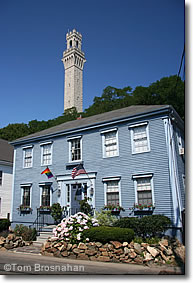
Tidy B&B beneath the Pilgrim Monument in Provincetown MA.
B&Bs can be simple houses with a spare room, a shared bath, and a simple breakfast, but most are in fact small inns that serve no meals except breakfast. The line between "inns" and "B&Bs" is blurred.
Taking in travelers and lodging them in a spare bedroom is a very old practice, of course, but it's relatively new in the USA.
"Tourist Homes"
After World War I, the rapid proliferation of motorcars led to the opening of "tourist homes:" residences with spare bedrooms for travelers. Some meals might be provided, according to the homeowners' wishes.
After World War II, American tourists flocked to Europe and the United Kingdom, often staying at pensions and bed-and-breakfast houses: adequate, congenial family accommodations at low prices. When the B&B fashion came to the USA, the houses were much more like inns, with more services, and higher prices to match.
B&B vs. Motel
America's true budget travel lodging is the motel, not the B&B. Motel virtues are speed, economy, anonymity, convenience and predictable comfort and services.
The B&B's virtues are a cozy family atmosphere, quiet residential location, and one-of-a-kind accommodations.
Some B&Bs have a half-dozen rooms, others only one or two; some serve a full, hearty sausage-and-eggs breakfast, others provide home-baked muffins and rolls; a few guesthouses provide no breakfast (making them B&non-B's, I guess.)
Guest rooms may be large or small, with a view or without—in short, nothing is standard...which is part of their charm.
Look at the Room!
Though one can describe hotel, motel, and inn rooms, which are usually of a certain standard, the only sure way to know what you're getting at a B&B is to look at the room yourself. Don't be afraid to ask about the features of a particular room: size, views, quiet or noise, bathroom with tub-and-shower or shower only.
Boutique Hotels
Perhaps the fastest-growing portion of the lodging industry, boutique hotels (or "city inns") are new or renovated city buildings offering all comforts and services in a more intimate, friendly setting. Because of their greater character, boutique hotels may charge room prices similar to larger, more elaborate city hotels.
Motels
The term "motel" is passé, but highway hotels do the bulk of the lodging business, from the inexpensive place at the Interstate highway interchange to the "resort motel" on the beach in Cape Cod. They vary in style and appointments, but all provide clean rooms with one or two double beds, private bath with shower and/or shower-and-tub, air conditioning, cable TV, Wifi, and telephone. Many also have in-room coffee makers, microwave ovens and small refrigerators. A light breakfast—or at least coffee and rolls—is often included in the room price.
Timeshares
Timeshare rooms, apartments and condominiums are available for rent or purchase in many of New England's most popular vacation destinations, from Boston and Cape Cod to the Berkshire Hills, the mountains and ski resorts of Vermont and New Hampshire and the coast of Maine. They offer a wide variety of accommodations, facilities and locations.
Hostels
Larger cities and some resort destinations have travelers' hostels with simple accommodations at budget prices. Dormitories and shared rooms and bathrooms may be gender-separate or mixed. Some hostels even offer private and semi-private rooms.
City Hotels
The familiar international lodging chains—Four Seasons, Hilton, Hyatt, Westin, etc.—are present in many New England cities, providing all the expected comforts and services at standard five-star rates. Weekend package plans can make these luxury lodgings more reasonably priced.
Resort Hotels
New England's lakes, mountains and seashores were once sprinkled liberally with Victorian-style grand hotels, gracious summer palaces set on vast grounds with every possible facility for their guests. Many have disappeared, the victim of changing times, but a few of the grandest (such as the Mount Washington Hotel) have survived and prospered; and some new grand hotels, echoing the old style, are even being built. Room rates are in the higher ranges.
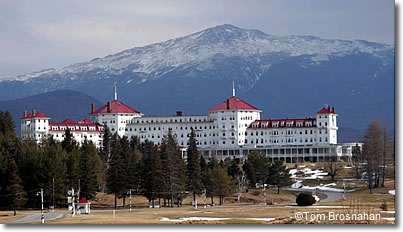
The grand Mount Washington Hotel at Bretton Woods, New Hampshire, site of the 1944 UN economic conference.
Most cities have at least a few local hotels, not managed by the big chains, with comfortable services at somewhat lower prices.
Camping
Forest campgrounds in state and national parks and forests are relatively simple and inexpensive. Private campgrounds offer many more services, at substantially higher rates.
